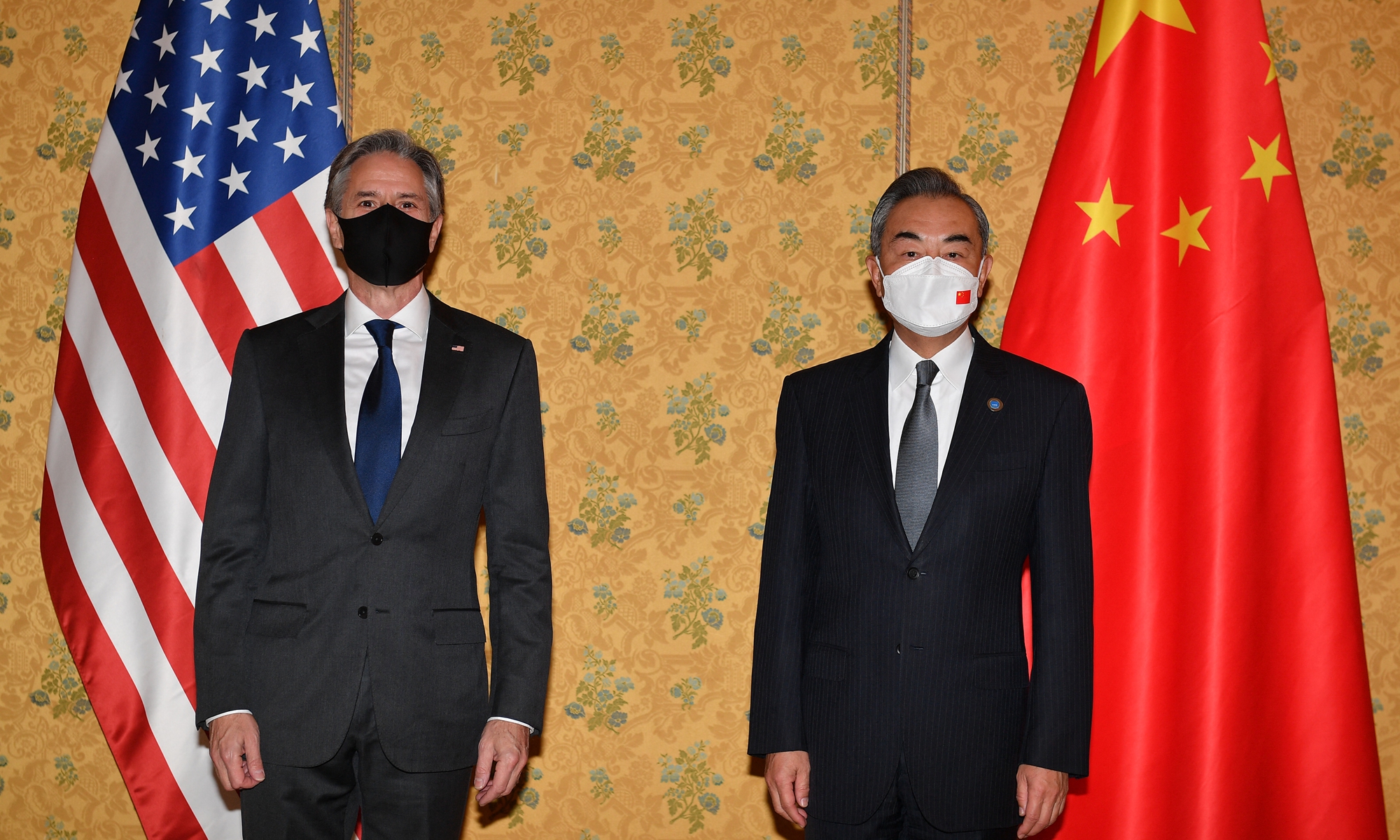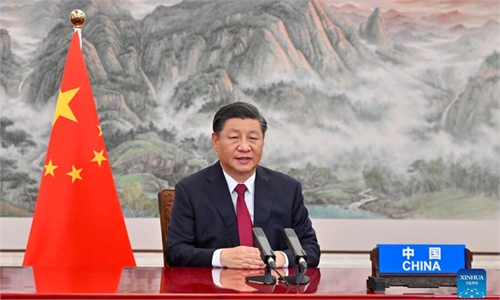China warns US on Taiwan question in Rome amid tensions
Subversive damage to ties includes a war between

Chinese State Councilor and Foreign Minister Wang Yi (right) and US Secretary of State Antony Blinken pose for photo prior to their meeting on October 31, 2021 at a hotel in Rome on the sidelines of the G20 of World Leaders Summit of Rome. Photo: AFP
Chinese State Councilor and Foreign Minister Wang Yi met US Secretary of State Antony Blinken on Sunday on the sidelines of the G20 leaders summit in Rome, Italy, the first face-to-face meeting between the top diplomats of the two countries after Blinken made a provocative statement challenging China's sovereignty on the Taiwan question, saying the US will support the island's secessionist authorities "robust" participation in the UN system.
According to the videos released by Yuyuan Tantian, a social media account affiliated with China's state broadcaster CCTV, Blinken and US delegates arrived at the residence of the Chinese delegation, entering via a side door. The meeting lasted for about 50 minutes. Wang and Blinken took photos together after the courtesy greetings, but did not shake hands or have a COVID-safe elbow bump, media reported.
Chinese analysts said these details show the atmosphere of the meeting was as tense as China-US relations, and although it will not ease the situation, keeping communication open will at least help the two sides avoid conflicts and manage their differences. On the US' constant provocations on the Taiwan question, Washington should take note of the gravity of the situation if China decides to retaliate, since the US has already provided excuses for China to activate the Anti-secessionism Law, experts suggest.
According to the website of the Chinese Foreign Ministry, Wang pointed out at the meeting that the US has repeatedly claimed it is China's changing status quo that caused recent tensions in the Taiwan Straits, which is totally untrue and a serious misrepresentation to the international community.
"The Taiwan question is the most sensitive matter between China and the US, and if the question is mishandled, it would bring subversive damage to overall China-US ties," Wang said, stressing that the real status quo of the Taiwan question is that there is only one China, and Taiwan is a part of China, and the mainland and Taiwan belong to one and the same country.
History has proved that any attempt to change the status quo will bring serious damage to stability in the Taiwan Straits, and even create a Taiwan Straits crisis.
Lü Xiang, an expert on US studies and a research fellow at the Chinese Academy of Social Sciences, told the Global Times that "the subversive damage to overall China-US ties" mentioned by Wang include "a war between the two countries" or other catastrophic consequences.
The crux of the current situation in the Taiwan Straits is that Taiwan secessionist authorities have repeatedly attempted to break the framework of the one-China principle, and the US is to blame for its connivance and support of secessionist forces, Wang Yi said.
Wang demanded that the US side commit to a genuine one-China policy, not a fake one, that the US fulfill its commitments to China, and that the US truly implements the one-China policy, instead of saying one thing but doing another.
In contrast to the March meeting between the top diplomats of the two countries in Alaska, when the Biden administration had not yet fully defined its China policy, the meeting in Rome focused on very specific issues, particularly the Taiwan question, Xin Qiang, deputy director of the Center for American Studies at Fudan University, told the Global Times on Sunday.
"The main purpose of the meeting for the Chinese delegation was to warn the US to be careful in its words and actions on Taiwan question, otherwise the China-US relationship and cross-Straits relations would be seriously damaged."
The reason China wants to stress the Taiwan question, an internal affair, with the US in this meeting is that it hopes the US understands its current approach is seriously shaking China-US relations, Diao Daming, an associate professor at the Renmin University of China in Beijing, told the Global Times on Sunday.
Blinken has reaffirmed that "the US will keep insistence on the one-China policy," according to the website of Chinese foreign ministry.
Lü said the US is unlikely to stop its provocative moves on the Taiwan question, and in the future, military tensions in the Taiwan Straits could escalate further. Since China has already pointed out the US duplicity on the Taiwan question, it is likely the People's Liberation Army (PLA) will send military aircraft to fly over the island. "This is a pressure test for the US 'one-China policy,' as this way we can see what consequences the US would like to face to keep its duplicity," Lü said.
Recently, the leader of the Taiwan secessionist authority openly confirmed a US military presence on the island. "If the Chinese mainland wants to solve the Taiwan question once and for all, the case is a perfect pretext to activate the Anti-secession Law," Xin noted. "The US should note how serious the consequences would be if they keep supporting the secessionist authority on the island diplomatically and militarily."
Hard to cooperate
Wang told Blinken at the meeting that "I am willing to build regular contact with you, to have frank and timely exchanges of views… to avoid miscalculation and explore cooperation."
Blinken said the US agrees that the two countries should develop bilateral ties based on the spirit of mutual respect, and be willing to keep communication with the Chinese side, to responsibly manage differences and avoid confrontation and crisis.
Wang also expressed China's serious concerns over the problems caused by US acts that damaged China's rightful interests, and demanded the US to correct mistakes to bring China-US ties back on track. Both sides also discussed issues including climate change, energy supply, the Iran nuclear deal, the Korean Peninsula situation, Myanmar and Afghanistan, and agreed to continue dialogues on dealing with global challenges.
Lü said if the US fails to correct its mistakes and keeps being provocative on sensitive matters like the Taiwan question, there is no chance for the US to get any cooperation or assistance from China.
"As long as the US stops provoking, China-US relations will be able to return to a reasonable track. Under such a framework, China and the US can explore more normal international relations issues, such as the G20, economic cooperation and environmental management," said Diao.




